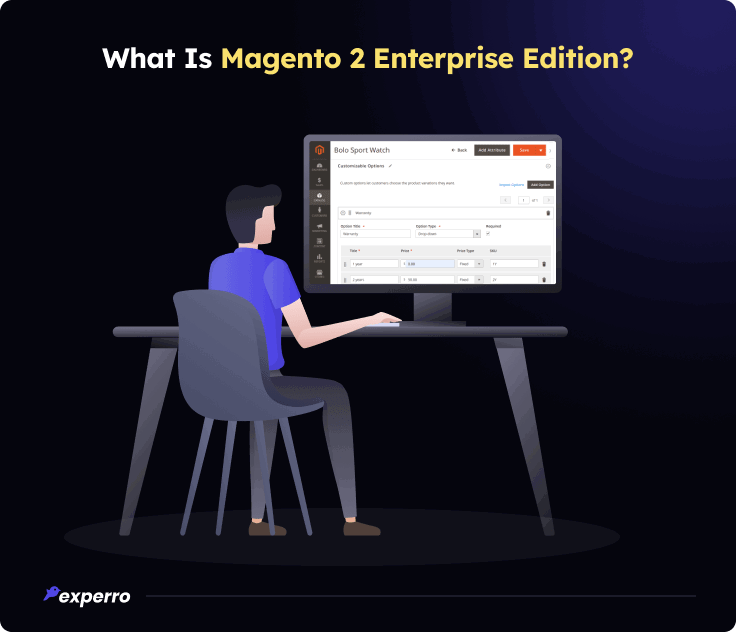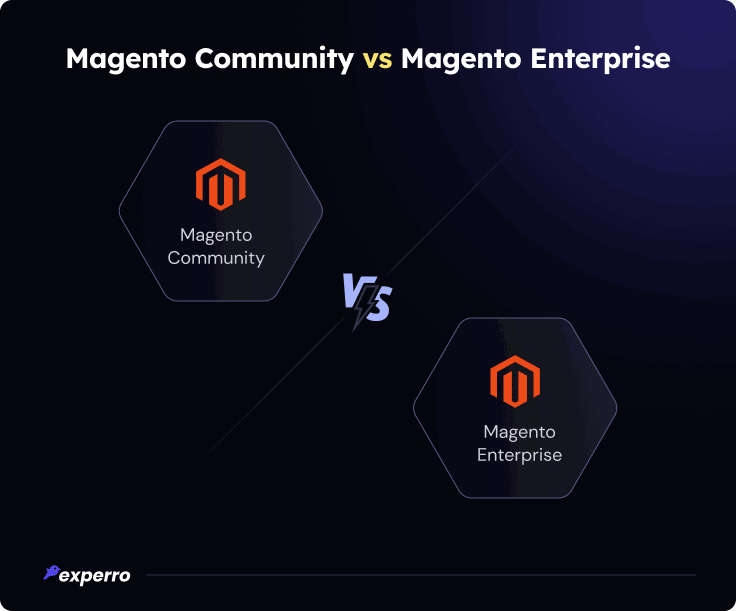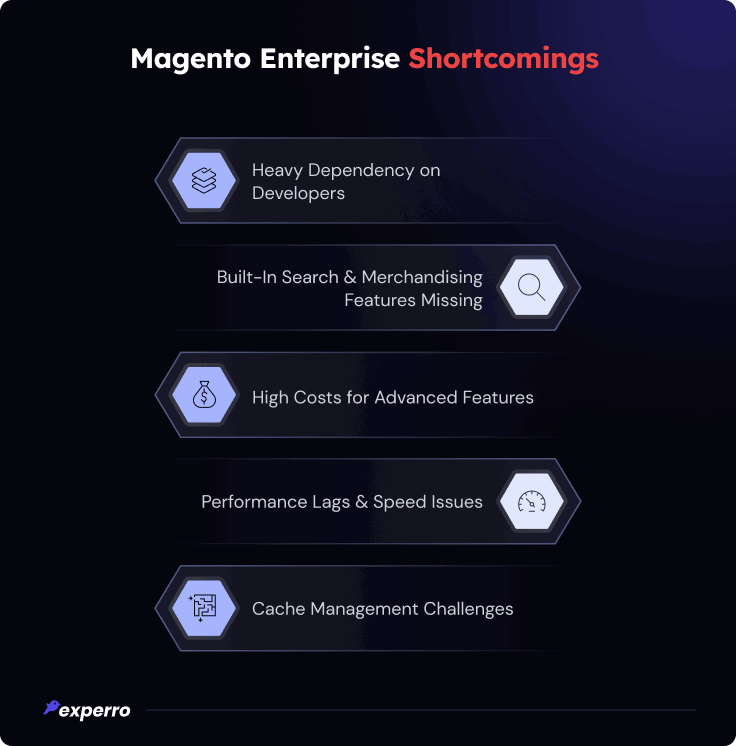Magento Enterprise: Help or Hindrance for Large Businesses?

What’s Inside
- What Is Magento 2 Enterprise Edition?
- What Is the Difference Between Magento 2 Community and Enterprise?
- Why is Magento Enterprise Not Suitable for Large-scale Organizations?
- How Can the Drawbacks of Magento Be Effectively Managed by Experro?
- Transform your eCommerce store with Experro's seamless Magento integration!
- Conclusion
Key Takeaways
- Adobe Magento Enterprise solution offers advanced eCommerce features, but it can be costly and complex to manage.
- Magento’s performance issues significantly hinder business agility and slow down operations.
- All integrations available in the market help with one solution. But Experro's headless integration with Magento has nth capabilities.
- Rely on Experro’s integration to enhance performance, speed, and personalization capabilities.
Are you sure ‘Magento Enterprise’ is the right fit for your large-scale organization?
The basic needs of an enterprise-level eCommerce business are:
- Scalability to handle rapid growth
- Flexibility & speedy implementation
- User-friendly setup and interface
- Lower maintenance costs
- Minimized learning curve
- Reduced technical expertise requirements
While Magento does provide for these business needs, it often doesn't meet them at the most optimal level. Enterprises need a platform that supports growth and scalability without constant overhauls.
These challenges indicate that Magento Enterprise Edition is not the most efficient, scalable, or cost-effective solution for large organizations.
To get the best platform that fulfills these needs, businesses should consider integrating with a platform like Experro.
What Is Magento 2 Enterprise Edition?

Magento 2 enterprise edition, also known as ‘Magento Commerce’, is a premium version of the Magento eCommerce platform.
The version is designed for large businesses, offering more Magento 2 enterprise B2B features and capabilities than the standard version.
This edition includes scalability, additional security measures, and extensive Magento enterprise support options.
It provides paid tools for marketing, product catalogs, design customization, and various Magento enterprise themes. It is a paid solution that caters to the needs of online stores requiring an eCommerce platform.
What Is the Difference Between Magento 2 Community and Enterprise?
Before choosing the platform, entrepreneurs need to understand the difference between Magento CE vs EE (Magento Community Edition vs Enterprise Edition).
Magento Community Support (Magento open source) and Magento Enterprise B2B (Magento Commerce) serve different business needs.

Feature | Magento Community (Open Source) | Adobe Magento Enterprise (Commerce) |
|---|---|---|
Cost | Free version | Paid, subscription-based |
Target Users | Small to medium businesses | Medium to large enterprises |
Support | Community-based support | Dedicated support from Magento |
Security | Basic security features | Enhanced security features and patches |
Scalability | Standard scalability | Enhanced scalability |
Features | Basic eCommerce features | Advanced custom features like customer segments, personalization, and business intelligence |
Customization | Customizable | Customizable with advanced paid tools |
Hosting | Self-hosted | Can be self-hosted or cloud-hosted |
Now, let’s dive into the pain points eCommerce enterprises face with Magento store frontend.
Why is Magento Enterprise Not Suitable for Large-scale Organizations?
We have already seen that Magento for eCommerce (the first version of Magento) is not your best choice in the market.
But ‘Adobe Magento Enterprise’ (the version that was released before Magento 2 launch) is also not suitable due to its loopholes.
The limitations of enterprise Magento can impact enterprise users. While it offers some robust features, loopholes of Magento enterprise weigh them down:

Below, we explore the disadvantages of enterprise Magento:
1. Heavy Dependency on Developers
Magento's monolithic structure limits flexibility. This means major developer involvement is needed for customizations without headless architecture.
Integrating new technologies becomes challenging, slowing down the time to publish the new features to large-scale businesses.
Not only have 20% of retail companies been leveraging headless commerce platforms; but over 60% of retail companies are gearing up to migrate by 2024.
2. Built-In Search and Merchandising Features Missing!
Magento product enterprise edition lacks built-in advanced search and eCommerce merchandising. Retailers need additional third-party tools to enhance Magento's product recommendation functionalities.
This leads to higher costs and complex integrations. It also results in a fragmented user experience.
3. High Costs for Advanced Features
The platform comes with a hefty price tag. Magento enterprise hosting, licensing, and development costs add up quickly.
For small to medium-sized online stores, this can be a significant financial burden. Advanced integration with a robust platform can offer better ROI.
4. Performance Lags and Speed Issues
The speed and performance issues often lead to slow load times and poor user experience in Magento-built websites.
High traffic can exacerbate (worsen) these problems. Magento speed optimization requires additional effort and resources.
5. Cache Management Challenges
Caching in Magento can be problematic. Poor cache management leads to displaying outdated content.
It requires constant monitoring and management. This adds to the operational overhead.
There are a lot of pain points of the platform like Magento enterprise SEO (search engine optimization) limitations and PCI compliance problems.
For more insights into the loopholes of Magento, check out our detailed blog on Magento issues.
How Can the Drawbacks of Magento Be Effectively Managed by Experro?
Magento is a powerful eCommerce platform, but it has its drawbacks. Experro can effectively manage these issues through its headless Magento integration.
Our platform supports Magento, enhancing its speed and performance. This Magento headless integration helps overcome Magento's common challenges like slow load times and complex customizations.
Experro's AI-powered search and eCommerce merchandising features improve user experience. Our platform simplifies backend processes, making inventory and content management easier.
Optimize your Magento store with Experro for a seamless, high-performing online presence. Transform your eCommerce experience with Experro's advanced capabilities.
Conclusion
Magento Enterprise edition provides powerful features but has significant drawbacks, such as high costs, performance issues, and a complex customization process.
However, Experro effectively addresses these issues through its headless integration, enhancing performance and user experience while simplifying backend processes.
By choosing Experro, you can transform your Magento Enterprise platform into a seamless, high-performing e-store.
Overcome the limitations and enjoy a robust, flexible eCommerce platform with Experro’s integration.
FAQs


Pallavi Dadhich
26 July 2024Pallavi is an ambitious author known for her expertise in crafting compelling content across various domains. Beyond her professional pursuits, Pallavi is deeply passionate about continuous learning, often immersing herself in the latest industry trends. When not weaving words, she dedicates her time to mastering graphic design.